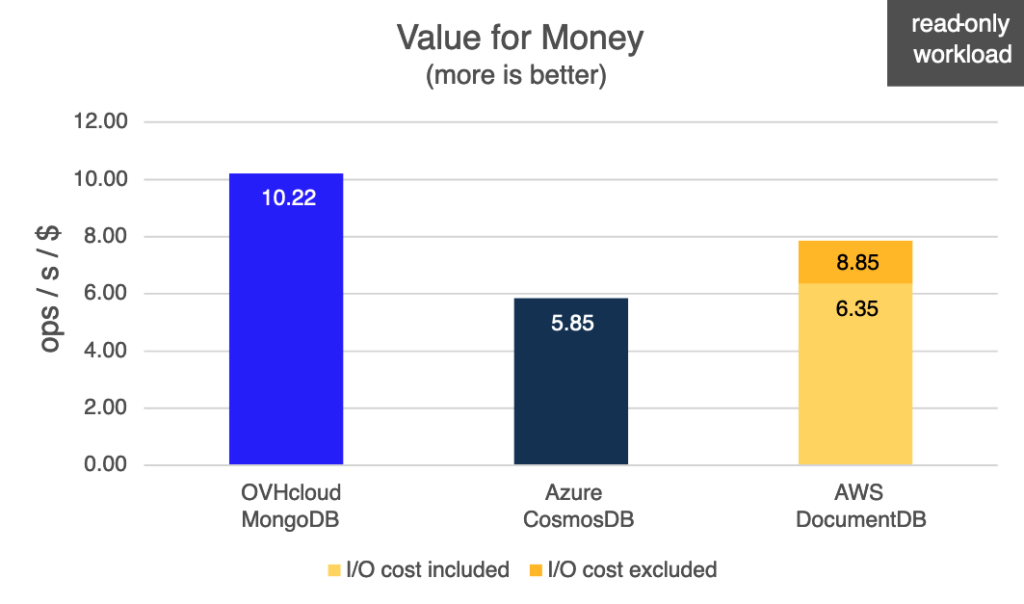MongoDB is currently the most popular NoSQL database management system! That’s what the Stack Overflow Developer Survey 2023 shows, ranking it 4th after PostgreSQL, MySQL and SQLite. Since its launch in 2007, the software has been downloaded more than 365 million times. The simple, fast and flexible MongoDB is commonly used to store different web document types, manage e-commerce website catalogues or other transactional services, and create new services or modernise existing applications.

MongoDB can also be a powerful data source for IoT, BI and data analytics platforms. However, deploying and configuring this popular database engine requires specialist skills. Moreover, you need adequate resources to manage the machines that host your databases (e.g., for maintenance, updates, obsolescence management).
Why migrate your MongoDB to a managed Database as a Service ?
Installing MongoDB on a single server, VPS or Public Cloud instance is straightforward, but it becomes challenging once your project is up and running and/or starts to gain momentum. This involves ensuring a stable environment, deploying a cluster with several nodes (a primary read/write node and read-only secondary nodes), or setting up automatic backups. This also means mobilising specialised resources that could be allocated to your main business — developing the best applications for your internal of external customers
OVHcloud offers a managed MongoDB solution. It’s managed for you by our team and hosted in a trusted cloud. This Database as a Service (DBaaS) solution designed and offered in partnership with MongoDB Inc., frees up your system administrators (SysAdmins) without the need to trade off your performance commitments. It’s not a shared service, user benefits from dedicated resources except for the Free Tier Discovery solution, where CPU and RAM are shared on a top of a mutualized Kubernetes stack. This service also helps you tackle the challenge of scaling your database, it comes with syncing and distributing data across several nodes. You can also automatically back it up (a feature included in paid plans).
Here’s why delegating the deployment and administration of your database to OVHcloud, a MongoDB infrastructure expert, is a good idea. You can achieve greater efficiency and build more reliable, powerful and secure applications, while optimising the total cost of ownership (TCO) and time to market of your data.
High availability, high performance, and resilience by design
All MongoDB solutions offered by OVHcloud rely on at least a 3-node replica set. Or a replica set of up to 7 nodes. This is to ensure your data is completely safe (full data redundancy) in the event of machine failure. But also to balance load across all nodes for optimal performance.
The OVHcloud Free Tier Discovery plan can handle up to 3,000 IOPS, higher paid plans up to 20,000 IOPS.
An independant benchmark substantiated by benchANT shows that it offers the best value for performance than other hyperscalers document-oriented DBaaS offers.

You can choose any of the OVHcloud datacentres — in France, United Kingdom, Germany, Poland and Canada (coming soon to the United States, Singapore, India and Australia) to host the service. This is an option that allows you to offer your service as close as possible to your app’s users.
Furthermore, automatic backup in a remote datacentre is included in the Production and Advanced plans, with one snapshot per day stored for a 14-day rolling period and a Point in Time Recovery (PITR) with a 30-day retention period, respectively.
Lastly, please note that the Discovery and Production solutions are based on the MongoDB Community version, meaning 100% compatible and ensuring optimal portability for your MongoDB services. It’s not the case for instance with AWS DocumentDB and Azure CosmosDB that uses proprietary software not fully compatible with original MongoDB APIs. The Advanced solutions are based on the Enterprise version, licensed from MongoDB.
Let OVHcloud manage the scaling of your MongoDB cluster
Anyone who has ever used MongoDB knows that as a database cluster grows, the question of how many machines you should have and how to size them always arises. As recommended by the publisher, the machines in the same MongoDB cluster should be configured the same way. Otherwise, the cluster’s performance would match that of the weakest machine in the pool, or worse, lead to more serious machine failures.
These are some of the pitfalls you will be avoiding by allowing OVHcloud to manage your database. With the Production solution, you get a 3-node replica set, which you can scale (vertical scaling) up to 4 TB storage, 60 GB RAM and 16 vCPU, to suit your core needs and optimise costs. You no longer need to over-dimension your cluster, provision machines, or manage their obsolescence. Furthermore, you can automate Database Management Systems (DBMS) using Terraform. You can be billed per use, allowing you to optimally provision resources to match your workloads.
Enhanced security
Another advantage of outsourcing the hosting and management of MongoDB to an expert like OVHcloud is that you can ensure enhanced security. The hardening, updates and security of the DBMS hosting will no longer be a source of concern, when common vulnerabilities and exposures (CVE) are detected. And also, updates and patches are applied as soon as they become available. This is done using a rolling update procedure that minimises service downtime, in coordination with customers.
Managed Databases for MongoDB can also be interconnected with your other OVHcloud services via the vRack private network, wherever they are located. This is to avoid exposing your databases on the public network. Please note that traffic and private network charges are included.
Lastly, you benefit from the anti-DDoS and data encryption technologies offered by OVHcloud, as well as ISO/IEC 27001, 27017, 27018 and 27701 certifications; and the HDS (hébergement de données de santé) certification in France. Your databases are compliant with healthcare data hosting standards in many countries.
Monitoring and support on the OVHcloud Control Panel
There are several solutions available. Especially via command-line tools and thick user interface clients. Much easier for monitoring your MongoDB cluster, which are provided by the publisher, or the community. However, you can always opt for simplicity, and monitor your data using features available on the OVHcloud Control Panel.
You will find, via the Control Panel, your database usage metrics consisting of number of read and write requests, number of clients using it, etc.. and CPU and RAM resources. This helps you to determine whether your cluster is the right size, i.e., if it’s too large or not enough. You can entrust OVHcloud with ensuring availability and alert processing — we will handle it for you and vouch for it. If the monitoring tools above offer you more indicators, the one provided by OVHcloud offers much more. It provides you with both real-time and historical data to compare with other time periods.
OVHcloud’s offerings including support provided by solution architects within the OVHcloud Professional Services team, working together with MongoDB Inc. teams to help you meet all your advanced needs, as well as different levels of 24/7 support plans.
Check the quick-start guide and login with your OVHcloud account to try your always-free MongoDB Discovery cluster !

OVHcloud Product marketer for Data products and solutions : Data Platform, Analytics & Databases

